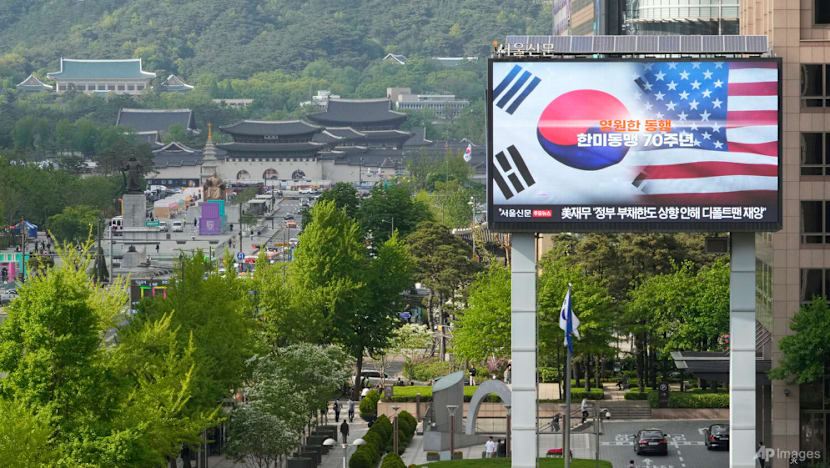US, South Korea unveil details on shipbuilding investment and submarines in trade deal

A screen shows flags of South Korea and the United States to celebrate the 70th anniversary of the South Korea-US alliance in Seoul, South Korea, on Apr 26, 2023. (File photo: AP photo/Ahn Young-joon)
WASHINGTON: The United States and South Korea released details of a trade agreement on Friday (Nov 14) that includes a US$150 billion Korean investment in the American shipbuilding sector and an additional US$200 billion earmarked for industrial sectors, the two countries said.
The joint announcement followed a meeting in October between South Korean President Lee Jae Myung and US President Donald Trump, where they agreed to a deal that would cut American import duties on South Korea's products to 15 per cent from 25 per cent.
"Finally, the South Korea-US trade, commerce, and security negotiations, which were among the biggest variables affecting our economy and security, are ... concluded," Lee said on Friday.
"Good competition requires excellent partners, and I believe President Trump's rational decision played a significant role in achieving meaningful agreement."
The announcement caps more than three months of wrangling over Trump's tariffs that have targeted trading partners around the world.
South Korea was particularly alarmed by the prospect of crushing duties on key exports like semiconductors and autos.
Lee, who took office five months ago with a mandate to steer the country away from the shock of a failed martial law imposition by his predecessor, had sought to score an early diplomatic win by turning an economic threat into an opportunity to boost the country's trade and security status.
Under the agreement, Lee said South Korea will form a new partnership with the US on shipbuilding, artificial intelligence and the nuclear industry, helping its ally "rebuild crucial industries just as the US helped South Korea in the past".
A fact sheet released by the White House said that the US gave approval for South Korea to build nuclear-powered submarines.
Washington will work closely with Seoul to find avenues to source fuel, it said.
The White House said South Korea will invest US$350 billion in the US, including US$150 billion in the shipbuilding sector.
SOUTH KOREA FX STABILITY
Washington also accepted South Korea's request that US$200 billion in cash investments as part of a US$350 billion package would come in instalments no larger than $20 billion a year in an effort to keep the won stable.
The fact sheet said the two countries have "a mutual understanding" that South Korea's investment should not "give rise to market instability" in Asia's fourth-largest economy.
If signs of instability appeared, South Korea could seek an "adjustment in the amount and timing of the funding, and the US will, in good faith, give due consideration to such request", the fact sheet said.
The US will cut tariffs on South Korean products, including autos, to 15 per cent from 25 per cent. Chips, another major export item made by companies like Samsung Electronics and SK Hynix, will face tariff terms no less favourable than those for Taiwan, a presidential adviser said.
The agreement with Washington shows Lee made inroads on major security and energy initiatives by paving the way to build nuclear-powered submarines and expanding its nuclear energy capabilities.
In a televised briefing on Friday, Lee's national security adviser said the two countries had discussed the issue of nuclear submarines on the "premise" that the vessels would be built in South Korea.
Trump previously said the submarines would be built in a Korean-owned shipyard in Philadelphia.
Analysts said it was too early to say whether South Korea got a better deal than Europe and Japan.
Doo Jin-ho, a security analyst at the Korea Research Institute for National Security, said acquiring nuclear submarines was no "game changer, but definitely better than any other weapons systems to beef up deterrence against North Korea".
Kim Dong-yup, a former Navy officer now at Kyungnam University, said the agreement on nuclear energy and security meant Seoul had to pay much more for defence, but Lee was faced "with an inevitable choice".
Washington "supports the process that will lead to (South Korea's) civil uranium enrichment and spent fuel reprocessing for peaceful uses", the joint statement said.
A trade deal was first unveiled in July, when South Korea agreed to invest hundreds of billions of dollars in US projects in exchange for lower tariffs.














